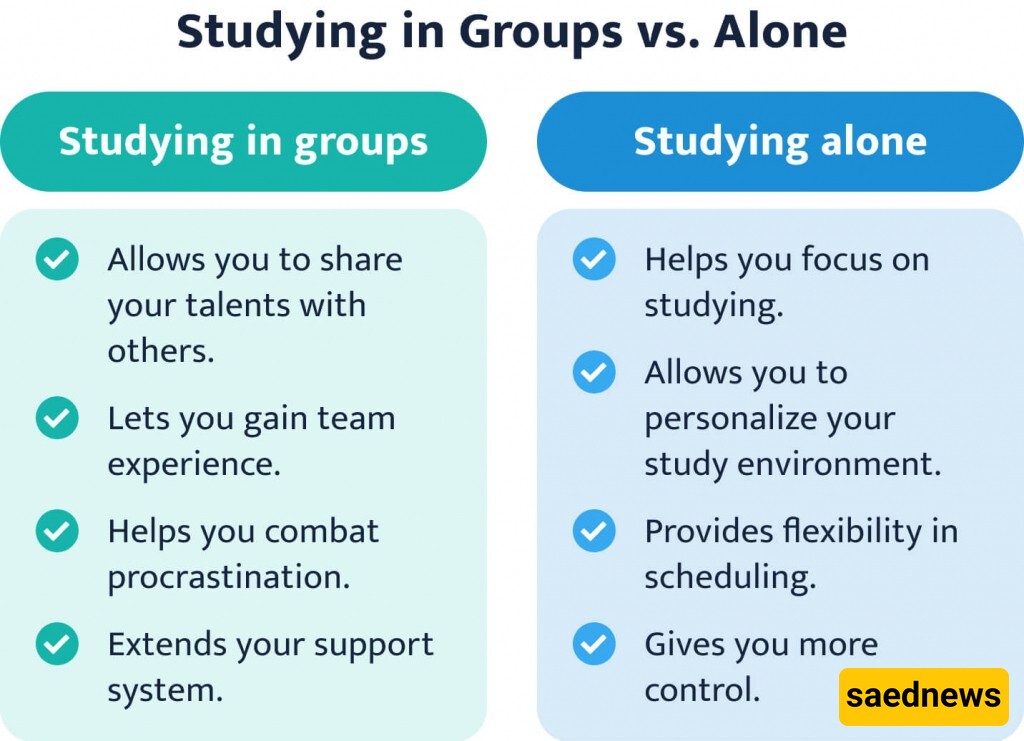SAEDNEWS: When it comes to studying English, choose between group and individual study is a typical challenge. Group study fosters interaction and collaborative learning, whereas solo study promotes flexibility and self-paced growth.

According to SAEDNEWS, Learning English is a very personal experience, but it also benefits from contact and practice. For years, students have debated whether group or alone study is more productive. While some people flourish in group settings, others find that alone study provides the attention and flexibility they require.
This article compares the benefits and drawbacks of both strategies to help you decide how to personalize your English-learning experience to your own requirements.
a. Real-time interaction - Group learning is a great way to practice speaking and listening skills with others. Participating in conversations, role-playing, and group activities simulates real-world conversation circumstances. A group conversation about current events may help students practice expressing their thoughts, asking questions, and debating in English.
b. Peer Feedback - Peers in a group environment might bring out mistakes in language, pronunciation, or use that would otherwise go unnoticed during solitary study. Constructive feedback encourages improvement.
c. Motivation and accountability- Studying in groups fosters a sense of accountability. Scheduled meetings provide consistency, and sharing progress keeps everyone engaged.
a. Different Learning Paces -Group members frequently have varying degrees of proficiency. This might slow down skilled students and overwhelm newcomers.
b. Distractions- Group discussions can wander off subject, especially when participants participate in other talks. Staying focused necessitates discipline and a common desire to learn.

a. Flexibility- Solo study allows students to choose their own timetables and focus on areas that they find difficult. You can select to practice grammar, vocabulary, or pronunciation.
b. Deep Focus Studying alone removes extraneous distractions, allowing for a more concentrated attention on certain activities or subjects.
For example, a student can spend an hour practicing irregular verbs without feeling pushed by group dynamics.
c. Customized Resources- Solo learners can select materials that are appropriate for their learning style, such as applications, textbooks, and online videos.
a. Lack of Interaction -Language is designed to be spoken, and solitary study lacks the conversational component of group learning.
b. Limited feedback- Without colleagues or an instructor, faults are easier to overlook. This can slow progress over time.
A hybrid strategy, rather than relying on a single method, is frequently more effective. For example, use individual study to improve grammar and vocabulary, and group sessions to practice speaking and collaborate on assignments. Apps such as HelloTalk enable students to communicate with others while studying alone.
Both group study and solo study have their unique advantages and challenges when it comes to learning English. Group study fosters collaboration, interaction, and accountability, making it ideal for improving conversational skills. Solo study, on the other hand, offers flexibility and the ability to focus on individual weaknesses. Ultimately, the best approach depends on your personal goals and preferences. By combining both methods, you can create a well-rounded learning experience that accelerates your English fluency. Whether in a group or on your own, the key is consistent practice and a genuine commitment to improvement.

